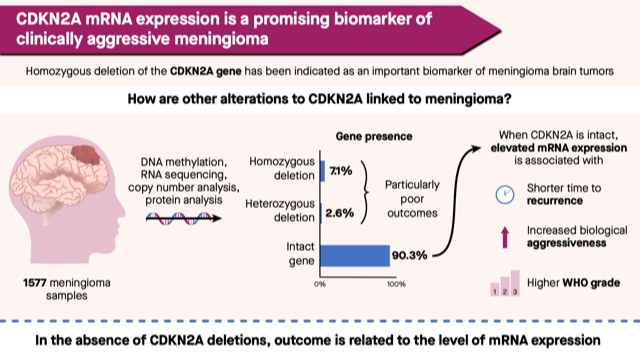This research, funded by us has identified a clinical biomarker, CDKN2A mRNA expression, which predicts how aggressive meningiomas may be in patients. This knowledge could help inform treatment options as those with high levels of this biomarker do not respond well to certain treatments.
Meningiomas make up nearly 25% of all primary brain tumours diagnosed in adults in the UK. They are the most common brain tumour in adults. And 20-30% of patients have clinically aggressive meningiomas that recur despite treatment.
Research into meningiomas has historically lagged behind other brain tumours, so these findings are an important step forward.
Meningioma research
Researchers studied over 1,500 meningioma samples from patients. And as a result were able to correlate high levels of expression of the CDKN2A gene with more aggressive tumours.
This is the first study to show that CDKN2A expression can be used as a standalone biomarker for meningioma diagnosis. This research showed that the level of expression of CDKN2A in tumour cells directly correlates to patient prognosis:
- high levels of expression equate to more aggressive tumours and a poorer prognosis
- low levels of expression, without deletion of the CDKN2A gene, equate to less aggressive tumours, and a better prognosis.
CDKN2A is a gene within our DNA which normally helps prevent tumour growth by stopping tumour cell growth and multiplication. When deletion or loss of CDKN2A occurs, tumour cells can grow and divide which leads to aggressive tumour growth. Loss of both copies of the CDKN2A gene (one from each parent) occurs in 1-5% of meningiomas. Losing this gene results in more aggressive tumours. And the World Health Organisation include this in their criteria for aggressive grade 3 meningiomas.
However, where the CDKN2A gene is present (in 90-95% of patients), expression of this gene needs to be tightly controlled in our cells as this research shows that high levels suggest poor prognosis.

Why is this research important?
The research is a major step forward in understanding and treating the most aggressive meningiomas.
Understanding clinically important biomarkers, such as CDKN2A, has the potential to change the way meningiomas are diagnosed. It could also help improve treatment options in the future. And will inform new clinical trials for drugs to treat these tumours.
Deletion of the CDKN2A gene is observed in many different cancers, including meningiomas, ovarian and bladder cancer. But for the first time, researchers have identified, on a molecular level, how mRNA expression levels of CDKN2A in meningiomas correlate to the prognosis of those with a meningioma diagnosis.
Dr Justin Wang, a Senior Neurosurgery Resident and PhD candidate at the University of Toronto, and first author of this study explained why the study was significant: “This study is important because it reveals that losing just one copy of the CDKN2A gene is associated with outcomes as poor as losing both copies. We have now discovered that in meningiomas that have not lost the CDKN2A gene (90-95% of all meningioma patients), assessing CDKN2A mRNA expression levels can be a new method to determine patient prognosis.”
Until 2021, meningiomas diagnosis used histopathology alone (a process where pathologists examine tumour samples with a microscope). But now, with an increased understanding of these tumours, researchers use more detailed molecular tests – improving diagnosis of meningiomas.
What do our experts think?
Dr Gelareh Zadeh, a Professor at the Department of Surgery University of Toronto, and principal investigator of this study said:
“This research is so important not only for improving our understanding of meningiomas, but also for improving the way that these brain tumours are diagnosed and treated.
“This research was made possible by collaborations with the International Consortium on Meningiomas and from data generated through research funded by The Brain Tumour Charity. Thanks to the data we were able to generate the hypothesis that CDKN2A expression was an important biomarker. And thanks to our international collaborations we were able to test this hypothesis in over 1,500 meningioma samples.”
Dr Farshad Nassiri, also from the Department of Surgery at the University of Toronto, who co-led this study said:
“We now know that this clinical biomarker, CDKN2A expression, is important for identifying how aggressive these tumours are. And can also inform treatment options for patients.
“Improved understanding of meningiomas at the molecular level can help inform future clinical trial design to find the best, targeted treatments that will work best against the most aggressive meningiomas.”
Dr David Jenkinson, Chief Scientific Officer at The Brain Tumour Charity, which is funding the research, said:
“Research that has a positive impact for those personally affected by a brain tumour is vitally important. And these advances in knowledge of meningioma are exciting new steps.
“The gold-standard for diagnosing brain tumours is to use molecular technologies to improve our understanding of a patient’s tumour and how best to treat it. With meningiomas being the most common brain tumour in adults, research is essential to ensure those diagnosed live longer, better lives.
“Understanding what makes a brain tumour aggressive at a molecular level, as this research has demonstrated, also gives us the opportunity to find new drugs and inform future clinical trial design for patients.
“Anyone affected by a brain tumour can speak to us for support and information on 0808 800 0004 or by emailing support@thebraintumourcharity.org. If you need someone to talk to, we’re here for you.”
Find out more about Dr Zadeh’s meningioma research

Dr. Gelareh Zadeh
Dr Zadeh is the head of the Division of Surgical Oncology within the Department of Surgery, University Health Network, Canada. She also holds a scientific post at the Adult Brain Tumour Centre, University of Toronto, Princess Margaret Cancer Centre
